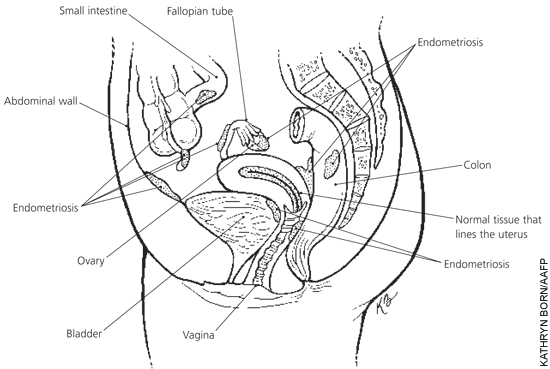
Am Fam Physician. 2006;74(4):601-602
See related article on endometriosis.
What is endometriosis?
Endometriosis (say: en-doh-me-tree-OH-sis) is a problem with the tissue that lines your uterus. Normally, every month when you have your period, this tissue comes out in your menstrual flow. If you have endometriosis, tissue grows on your ovaries, abdominal wall, bladder, or other areas (see drawing). When you have your period, this tissue swells and bleeds. This can be very painful.

How do I know if I have endometriosis?
You may have endometriosis if you have very bad cramping and pain during sex or at the beginning of your period. Some women may have lower back pain or rectal pain. But there are many other health problems that can cause pain like this. The only way for your doctor to be sure is to do a laparoscopy (say: lap-ah-ROSS-kah-pee). This is a way of looking inside your abdomen by making a small cut in your skin and putting a thin tube inside. If your doctor decides to do this, you will be given medicine so you won’t feel any pain.
How is it treated?
There are medicines that can help you feel better. These include over-the-counter pain medicines like ibuprofen (one brand: Motrin) and acetaminophen (one brand: Tylenol).
Taking birth control pills or shots also might help. Your doctor may give you a prescription for other medicines.
What do these medicines do?
Some of these medicines only treat the pain of endometriosis. Hormone medicines stop your periods. This may cause side effects like the ones women have at menopause, such as hot flashes and vaginal dryness. Sometimes the side effects go away if you also take an estrogen pill every day. A medicine called danazol (brand name: Danocrine) can cause acne and facial hair.
Can I still get pregnant?
It is important not to get pregnant while you are taking these medicines. If you want to get pregnant after the treatment is over, these medicines don’t improve your chances of getting pregnant. If you don’t want to get pregnant after the treatment, you should keep using birth control.
What about surgery?
Some women need surgery to treat their endometriosis. Surgery might make it easier for you to get pregnant, but you still might need fertility treatments. There are several different types of surgery that can be done to treat endometriosis. Talk to your doctor to find out which one is best for you.
Does endometriosis ever go away on its own?
For many women, endometriosis goes away at menopause, when their periods stop. Until menopause, medicine and surgery may be able to help with symptoms of endometriosis.
Where can I get more information?
Your doctor
Endometriosis Association
Telephone:1–800–992–3636
Web site:http://www.endo-online.org
National Institute of Child Health and Human Development
Web site:http://www.nichd.nih.gov/publications/pubs/endometriosis/index.htm